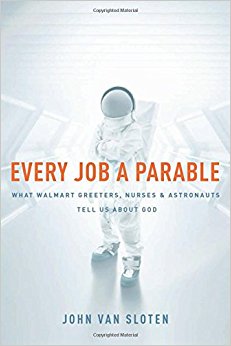 Every Job a Parable: What Walmart Greeters, Nurses & Astronauts Tell Us About God John Van Sloten (NavPress) $14.99
Every Job a Parable: What Walmart Greeters, Nurses & Astronauts Tell Us About God John Van Sloten (NavPress) $14.99
It is fascinating to me that there seems to be always new, fresh ways of saying important things. Granted, I sometimes grow a little cynical about publishers who release yet another lack-luster book full of basic stuff about Christian living or having a happy family or how to read the Bible; do we really need yet one more on our already crowded shelves that seem to offer little that is new?
But then, just when we’re pretty sure there isn’t much more to say in a particular field, new titles come out that become must-reads for anyone wanting to think deeply and enter a national conversation. Just take another look at our BookNotes newsletter from a week or so ago that not only offered bunches of links to bunches of books about the faith and the arts, but named three recent titles that are extraordinary and important, fresh and new and good.
Or recall our most recent post, again offering a handful of links to many previous books (on race, racism, multi-cultural ministry and such) which then suggested that the newly released The Myth of Equality is an instant classic that you really ought to get.
 And so it is that I now want to announce that the new book by John Van Sloten, Every Job a Parable: What Walmart Greeters, Nurses & Astronauts Tell Us About God is a must-have, gotta-read, truly remarkable new book in a field that has become nearly glutted in the last year or to; it brings something new to the table, as they say, and captured my attention from the very title and cover. Just when I thought we might not need any new books on this topic for a while, this is an exceptional contribution, surprising for how good and fresh it is.
And so it is that I now want to announce that the new book by John Van Sloten, Every Job a Parable: What Walmart Greeters, Nurses & Astronauts Tell Us About God is a must-have, gotta-read, truly remarkable new book in a field that has become nearly glutted in the last year or to; it brings something new to the table, as they say, and captured my attention from the very title and cover. Just when I thought we might not need any new books on this topic for a while, this is an exceptional contribution, surprising for how good and fresh it is.
I’m not complaining about the many books that have appeared in the last few years as part of the faith and work conversation – that we can even speak of a national conversation and a movement is in itself one of the most remarkable and notable things on the religious landscape in North America these days. (By the way, I’m speaking at an annual conference on these very things in Denver this fall.) The many recent books that have come out have emerged interested generated by those who in the last decade have taken up the project of teaching about the integration of faith and vocation, calling and career, worship and work. From seminal late 20th century activities (including the work of the Laity Lodge in Texas, who now promotes The High Calling blogging community, the publication of a series of books in the 1980s by Augsburg-Fortress inspired largely by Bethlehem Steel Executive William Diehl who wrote Thank God It’s Monday, and the Dutch neo-Calvinists in Canada whose uniquely Christian, principled, labor union (CLAC) published periodicals and organized conferences and released books about serving God in the work world. Os Guinness’s brilliant, game-changing book The Call was a major work recovering the dynamic of the Protestant understanding of calling and books like Heaven Is Not My Home: Living in the Now of God’s Creation by Paul Marshall (who had written for CLAC often) spelled out a distinctively Christian view of work, rest, and how discipleship might be lived out in the spheres and careers of education, art, politics, business, science and more. Marketplace ministries, as some have called at least one aspect of this movement, were promoted through organizations like IVCF and the CCO (and their Jubilee conference, founded in the late 1970s with this topic as an integral part of its Kingdom vision of reaching college students with the cultural implications of the gospel) and, always, at Regent College in British Columbia. In the late 1980s the good publisher of this new book, NavPress, had a great book (now out of print) simply called Your Work Matters to God, and we featured it often. We here at Hearts & Minds put together a little gathering at our own church decades ago called FaithWorks.
And now we’ve got vocation-oriented think tanks and regional work-world ministries, and video series for church use (such as the brilliant, serious, REFRAME DVD series from Regent College) and all kinds of good stuff that was unimaginable a few decades ago.
Since we’ve often offered lists of books about vocation and calling and about faith and work (see a massive list HERE or a little essay about two jobs I had 40 years ago (complete with a James Taylor video clip and a review of Keller’s Every Good Endeavor) HERE or, more recently, a useful list HERE) we don’t have to list a lot more here. I put together some “industry specific” book lists for Redeemer Presbyterian’s Center for Faith and Work which you can see, HERE. Just know that there are plenty of resources, and they keep coming. In just the last year or two, we’ve recommended many, including these:
- (Re)Integrate Your Vocation with God’s Mission Bob Robinson (Good Place Publishers) $12.00 Of the many books on this topic, this is the only one that really offers a big picture and a specific conversation for relating faith and work, designed as a small group resource complete with a leaders guide included. Nothing like it in print, and, gratefully, it is really well done. Yes!
- How Then Should We Work?: Rediscovering the Biblical Doctrine of Work Hugh Whelchel (Institute for Faith, Work, and Economics) $13.95 This book is not as well known as it ought to be but spells out a faithfully Biblical vision as clearly as any book we know. Concise, solid, and very helpful.
- The Gospel Goes to Work: God’s Big Canvas of Calling and Renewal Dr. Stephen Graves (KJK Inc. Publishing) $10.00 For the price, this brief and very handsome book is a treasure. Really insightful, practical, upbeat and nicely designed.
- Henry’s Glory: A Story for Discovering Lasting Significance in Your Daily Work John Elton Pletcher (Resource Publications) $19.00 Written like a novel, a parable or sorts, helping church folks realize that common work matters.
- Work Matters: Connecting Sunday Worship to Monday Work Tom Nelson (Crossway) $16.99 One of our most recommended titles, this tells the story of what happens to a local church when a pastor commits to equipping folks for all-of-life-redeemed faith and work-world mission.
- Work Matters: Lessons from Scripture Paul R. Stevens (Eerdmans) $16.00 Although Dr. Stevens (of Regent College in Vancouver, BC) has written much about faith, work, calling and such, this small book offers bunches of Bible explorations. Just wonderful.
- Work: A Kingdom Perspective on Labor Ben Witherington, Jr. (Eerdmans) $19.00 It is so good to have one of our best New Testament scholars weighing in on a Christian philosophy of work. Very nicely done.
- Every Good Endeavor: Connecting Your Work to God’s Work Timothy Keller & Katherine Leary Aldsdorf (Riverhead) $17.00 One of the very best books in the field. Important for anyone serious about this topic.
- A Woman’s Place: A Christian Vision for Your Calling in the Office, the Home, and the World Katelyn Beaty (Howard Books) $22.99 The only really good book on a Christian perspective vocation, calling, and work written about the role of women in the work-world. Highly recommended for men and women.
- Kingdom Calling: Vocational Stewardship for the Common Good Amy Sherman (IVP) $18.00 Oh my, this is perhaps the thorough study, offering various levels or models and ways to relate faith and work, being good stewards of our vocations for God’s sake. A truly significant volume.
- Finding Livelihood: A Progress of Work and Leisure Nancy Nordenson (Kalos Press) $14.95 We love this because it is so eloquent, so lovely and wise, a deeply spiritual and literate rumination…
- Visions of Vocation: Common Grace for the Common Good Steve Garber (IVP) $ Eloquent, mature, thoughtful, beautiful, Garber tells stories of those who endure in God’s call upon their lives even when things are broken and hard, because of their deep awareness of God’s covenantal relationship with the creation and Christ’s grace, giving their lives deeper meaning and purpose, living in the world as it really is. Few books have so richly captured the imaginations of so many in recent years, as Garber weaves together insights from Wendell Berry and Bono and other thoughtful writers and theologians, framing his storytelling of real folks he know well.
DO WE REALLY NEED ANOTHER BOOK ON WORK?
 And so it was that when I heard that John Van Sloten was doing a book on work, I was eager to read him — he’s a truly great writer, colorful and dynamic, even, as you can see from his fabulous book about pop culture called The Day Metallica Came to Church: Searching for the Everyday God in Everything (published by Square Inch Press; $14.99.) I really trust his perspective, too. But I was also a little nonplussed, if truth be told. “Do we really need another book on faith and vocation, serving God in the work-world,” I asked him. After the earliest voices being mostly ignored for a few decades, this topic has finally taken off and the many good books that are coming out are going to start sounding the same. Is there really anything new that must be said?
And so it was that when I heard that John Van Sloten was doing a book on work, I was eager to read him — he’s a truly great writer, colorful and dynamic, even, as you can see from his fabulous book about pop culture called The Day Metallica Came to Church: Searching for the Everyday God in Everything (published by Square Inch Press; $14.99.) I really trust his perspective, too. But I was also a little nonplussed, if truth be told. “Do we really need another book on faith and vocation, serving God in the work-world,” I asked him. After the earliest voices being mostly ignored for a few decades, this topic has finally taken off and the many good books that are coming out are going to start sounding the same. Is there really anything new that must be said?
John replied that he thought he had a unique viewpoint, something fresh, an angle that hasn’t been deeply explored lately.
And, wow, does John deliver in this exact way, providing a new way into the conversation, solid, Biblical teaching, and lots of interesting inspiration for anyone wanting to find God in the day to day and serve Christ in ordinary jobs. Ordinary jobs? Maybe I said that wrong — perhaps, a la C.S. Lewis’s line about mortals, there are no ordinary jobs. In Van Sloten’s well-crafted chapters, every job sounds like a symphony, every work place holy ground.
 So, here is how he brings new insight and consequently new energy for thinking and talking about Christian calling in our working lives. The subtitle isn’t just rhetoric or a cleverly-worded stand- in for “another “Christian perspective work.” No, he really, truly, does talk about the textures and tasks of these different jobs. He’s interviewed all kinds of folks who work at all kinds of jobs. It isn’t generic. It is specific, and the jobs explored are so vividly shown that no matter what your own job is, you will be blessed by reading about these other callings and careers. I’m not kidding – on the face of it, hearing how brothers and sisters in Christ find ways to see their day to day as holy callings and frame their sometimes mundane jobs by their faith is a blast. You will love hearing about a judge and a landscaper and a florist and an asphalt company executive and a custom automotive restorer. Who knew that being a language translator or nephrologist or middle manager could be so interesting!
So, here is how he brings new insight and consequently new energy for thinking and talking about Christian calling in our working lives. The subtitle isn’t just rhetoric or a cleverly-worded stand- in for “another “Christian perspective work.” No, he really, truly, does talk about the textures and tasks of these different jobs. He’s interviewed all kinds of folks who work at all kinds of jobs. It isn’t generic. It is specific, and the jobs explored are so vividly shown that no matter what your own job is, you will be blessed by reading about these other callings and careers. I’m not kidding – on the face of it, hearing how brothers and sisters in Christ find ways to see their day to day as holy callings and frame their sometimes mundane jobs by their faith is a blast. You will love hearing about a judge and a landscaper and a florist and an asphalt company executive and a custom automotive restorer. Who knew that being a language translator or nephrologist or middle manager could be so interesting!
RENEWED VOCATIONAL IMAGINATION
If that was all this wonderfully written book did, that would be enough. Like an overtly Christian version of the also inspiring Callings: The Purpose and Passion of Work (created by NPRs StoryCorps, edited by Dave Isay and now out in paperback published by Penguin; $16.00) it is just a blast hearing about all these remarkable moments in the day to day of our friends and neighbors. Not too many of us, I suppose, have had earnest conversations about the joys and struggles of being a scientific researcher or farmer or photographer or forensic psychologist, so when we listen in to Van Sloten’s stories, we are getting a window into amazing part of our social fabric, God’s good world teeming (as Genesis puts it.) It’s just a delight, and I think inspiring, and reading about police officers or emergency room physicians or labor negotiators will make you a better citizen and neighbor and church friend when you have a clue about what others do day by day. It’s fun to read and it’s truly informative. I hardly know any other Christian book that so nicely introduces us to our friends and neighbors and what they do.
And in all of this, to use a splendid phrase he introduces in the first chapter, Van Sloten wants to spark a “renewed vocational imagination.”
However, Van Sloten’s project is more than to just affirm varying careers as holy callings, more than just offering a word of encouragement or window of insight into Christian living in the work-a-day world.
To catch his deepest intent, you have to take literally his title, that jobs can be parables. And you must notice a phrase in the colorful subtitle; he is exploring what these various careers “tell us about God.”
JOBS AS PARABLES
Like any good parable – and wasn’t Jesus a master teacher using parables as the core to his Kingdom instruction – we must hold it up to the light, ponder its multi-faceted nature, its luminosity, its pliability. Every Job a Parable is divided into four main parts, and one part (comprised of two chapters) is called “What Is a Parable, and How is Work a Parable?” In this part we are taught how to “notice God’s unnoticed presence” – and he does this by telling us a great story about a sanitation worker. Another really interesting chapter in this part is called “The Iconic Nature of Vocational Parables: How Reversing Your Perspective Changes Your Vocational Point of View.” This is rich, curious stuff, inviting us embrace his experiment – can we find God at work? Can we learn something about God at work? Can our work become parabolic? Can they be, literally, iconic?
BEAR WITH ME ON THIS SIDEBAR
Allow me this one sidebar comment: I think John makes it clear what the best books on this topic make clear — that we don’t have to add on some extra spiritual layer of God-talk on top of our ordinary day jobs. We don’t have to sanctify them by “bringing” God into the “secular” work world. We don’t have to do evangelism on the job, we don’t have to somehow spiritualize them with religiosity. Being made in God’s image and tasked with culture-making, it is simply what we do, coram deo, as humans. We make or manage stuff; we reflect God’s own care for the world as God’s partners, vice-regents, stewards. We work because we are blessed to do so (the command to gently “take dominion” and to “tend and keep the garden” was given to our primordial parents before the curse of the fall, of course, making it what Al Wolter’s calls “the foundational command.”) Work may be hard, even awful, in a fallen world but it is still in principle a fundamental good, a wondrous human trait in a God-ordered if distorted world. So a Christian view of work always starts with the inherent dignity and meaning of labor.
Of course in a world that has (mis)understood and framed work as something other – an idolatrous way to make meaning, find identity, or get rich, or something bad (“a necessary evil” which we try to avoid, and about which we say derisively, TGIF) – we really do have to proclaim a new vision. Books like Every Good Endeavor and Work Matters and Kingdom Callings help us offer a proper framework. Which is to say, we all need to be able to articulate a Christian perspective to counter the world’s unhelpful and erroneous narratives about the meaning of work. To be motivated by a truly Christian perspective about work and to be able to explain that to our family and colleagues and neighbors really will give us a huge opportunity to bear witness to God’s work in our lives. But, again, to counter a misguided narrative with a more wholesome, winsome, healthy view of work as inherent to the image dei and our office as stewards of God’s good work, is not to say work is barren and secular and we have to somehow bring God into it, or justify our work because it is a spiritual thing or a mission field. To paraphrase what Hans Rookmaaker said about art, “Work needs no justification.”
Van Sloten gets all this and he explains it wonderfully drawing on the very best theologians and writers such as Richard Mouw, Cornelius Plantinga, Jurgen Moltmann, Norman Wirzba, Miroslav Volf, Nicholas Wolterstorff. As a Christian Reformed Church pastor he draws on Calvin and Luther and Kuyper and Bavinck. As a contemporary thinker, he knows sociologists like Fredric Jameson and Barbara Ehrenreich and Alain de Botton as well as popular authors like Luci Shaw, Rob Bell, Scot McKnight, Kathleen Norris, and Tom Wright. His love for pop culture sneaks in, such as when he tells about the cult-classic, oddly moving documentary about a one-hit rock wonder, Searching for Sugar Man. I love a book that is well-researched and cites interesting sources, and this book is fabulously done in this regard, quoting not just Reformed theologians and contemporary thinkers about the work-world, but exceptionally interesting writers like Marilyn Robinson and John Donne and scientists and reporters and artists and monks and mystics. But, more importantly, these wisely incorporated quotes and citations are added on to his own utterly excellent perspective on work, culture, society, understood and related to God’s gospel story of creation, fall, and redemption. Van Sloten is a good thinker and a good writer.
WHOA.
SAY WHAT?
Van Sloten is fully reliable (did I mention he quotes Wisdom and Wonder by Kuyper, a book I even have an endorsing blurb on?) and yet he writes provocative stuff grounded in this reformational worldview, stuff that I am still pondering like this, which comes early on in the book:
Recently there has been a lot of talk about the idea of working for the common good — for the good of your neighbor, society, classmate, environment, and world. A lot of people think this is the ultimate objective when it comes to work.
While working for the common good is an important part of a balanced vocational worldview, it is not all that work was meant for. In fact, it can get in the way and become an impediment to work’s chief purpose: a real-time knowing and experience of God. When this happens our jobs can become nothing more than a works-based means of vocational salvation. Work becomes something that is based on what we do for God, as opposed to who we are before God.
I don’t think he intends to make work into some super-spiritual experience, or a pretense for something else, as if doing the work doesn’t matter; not at all. And he insists that our work and faith should impact our world well. In fact, he emphasizes that, in God’s common grace, doing the work indeed matters. But he wants to prevent us from overstating some world changing result, something extrinsic that makes work matter. Most of us, in fairly ordinary jobs, just don’t have that sense of “making a difference.” And, again, this is what makes this book shine — Van Sloten tells the stories of such non-dramatic, ordinary jobs, such as a flyer delivery person, a Walmart greeter, an electrician, hairstylist, food server, a residential landlord, and so many more.
HIS MAIN POINT & HIS UNIQUE CONTRIBUTION
 So, having said that, we can now safely, without misunderstanding, proceed to Van Sloten’s main point, that work is a parable that teaches us and the watching world something about God. As I’ve suggested, in the hands of a lesser thinker or more simplistic writer, this would come across as if work itself doesn’t really mater, that we live in some dualistic world made up of the ordinary, material stuff and then some super-spiritual added on aspect, and that we have to somehow balance body and soul, sacred and secular, work and spirituality, with the spiritual encounter bit being above and perferred to the mundane down to Earthier stuff. To be clear: he does not say that because he does not believe that. Work matters, we serve God in ordinary ways, we find our meaning as humans doing real-world,
So, having said that, we can now safely, without misunderstanding, proceed to Van Sloten’s main point, that work is a parable that teaches us and the watching world something about God. As I’ve suggested, in the hands of a lesser thinker or more simplistic writer, this would come across as if work itself doesn’t really mater, that we live in some dualistic world made up of the ordinary, material stuff and then some super-spiritual added on aspect, and that we have to somehow balance body and soul, sacred and secular, work and spirituality, with the spiritual encounter bit being above and perferred to the mundane down to Earthier stuff. To be clear: he does not say that because he does not believe that. Work matters, we serve God in ordinary ways, we find our meaning as humans doing real-world,  down-to-Earth stuff, imaging God in this good if fallen world. But, yet, by mirroring God and partnering with God, we can indeed experience God in the midst of all this: it is not merely that we work and honor God in this task of being human. We honor God and serve the common good and learn more about God by observing the very structures of reality and the ways different jobs work. Just like the Bible says we can learn something about God from the stars or from other aspects of creation (Job suggests we talk to the fish and Isaiah says farmers are instructed by God how to learn about seeds!) Van Sloten says we can learn about God by opening our eyes and seeing what’s going on in our workplaces. Work is an icon, work is a parable, work is a school for spiritual formation, work is the venue for knowing God.
down-to-Earth stuff, imaging God in this good if fallen world. But, yet, by mirroring God and partnering with God, we can indeed experience God in the midst of all this: it is not merely that we work and honor God in this task of being human. We honor God and serve the common good and learn more about God by observing the very structures of reality and the ways different jobs work. Just like the Bible says we can learn something about God from the stars or from other aspects of creation (Job suggests we talk to the fish and Isaiah says farmers are instructed by God how to learn about seeds!) Van Sloten says we can learn about God by opening our eyes and seeing what’s going on in our workplaces. Work is an icon, work is a parable, work is a school for spiritual formation, work is the venue for knowing God.
And all I can say is wow. Every Job a Parable takes what most of the best books on work all suggest and develops it well, vividly and practically, making this a book as much about spirituality as a book about calling, a book about faith formation as much as a book about careers, and a book that unites love of God and love of neighbor in ways that no other book about vocation/work has so successfully attempted. It is a book that anyone involved in this faith-in-the-work-world movement or leading this faith/work conversation simply must get.
HOW DOES HE DO IT?
GET THIS!
I want to bring this celebration of Every Job a Parable to a close by saying one of the most important things about it, other than it is rooted in a solid and wholistic worldview that affirms the dignity or work and that it offers a unique spirituality of work, helping us not only think faithfully about our callings in the work-world but how we can come to know God better within our job sites.
And it is this: that Van Sloten created this book out of a major project in his church (New Hope Hillside Church in Calgary, Alberta) where he preached sermons inspired by various careers and jobs that he set out to learn about.
Allow me to say that again: he preached a whole series of sermons inspired by various careers and jobs.
There is a page in the back of this book that is itself worth twice the price of the book, and that is the list of website addresses to the videos of Van Sloten’s sermons inspired by these various jobs. You can find them at youtube, too, so do check him out and see what inspired the book.
REAL JOBS OF ALL SORTS
And, wow – what careers and jobs he explores. And what creative sermons they are. There you can watch sermons about a police officer, a journalist, a city mayor, an optometrist, and audiologist, a human resource manager, a development worker, a university professor, a software engineer, a group of seven artists, a midwife, a custom car restorer, a radiation physicist, a professional skier and base jumper, an Olympic breaststroker, and a teacher.

There is on page 210 and 211 a nifty index of vocations mentioned, chapter by chapter throughout the book. And, I might add, these are not passing references to a craftsperson or neuroscientist or investment banker, but really interesting explorations of the parabolic or iconic nature of these jobs, how they point to some aspect of God or Christ’s redemption. You will have to read the book for yourself to see if Every Job a Parable rings true and is helpful in doing this or if he’s stretching to reach these conclusions. Is he over-reaching to make these jobs teachable moments? Maybe not all of the stories of work and workers he explores are as compelling as some, but I think he’s really, really on to something here. There is no other book like it.
EVEN THE CROOKED AND IMMORAL
Just to entice you just a bit more, some of the chapters explore what we can learn not from insightful and generous saints in the marketplace, but from, well, a crooked lawyer, an immoral federal politician, and a befuddled accountant. He interviews and develops insights from an atheist writer, too. (Not only is he serious about the broken nature of work and the messes of this life, but also he really does believe that God shows up “everywhere in everything.”
AND A MOTHER, A FATHER, A CHILD, AND A MAN WITH DOWN’S
Further, happily, there are those whose callings take them to vocations that aren’t traditional paid employment – he tells of a father, a mother, and a man with Down’s syndrome. There is one nice story about the vocation of a child.
Every Job a Parable: What Walmart Greeters, Nurses & Astronauts Tell Us About God is a book that has been waiting to be written, and I am grateful that John did his homework, interviewing software engineers and optometrists and, yes, a professional skier and doing those sermons. I’m glad that the book added other stories of other workers and callings. He was well-equipped to do this because of his being so well informed by his own tradition in the Dutch Reformed community, drawing on Kuyper and his rich theology of “common grace.” That is, his first book – The Day Metallica Came to Church – set the stage for this book. If he could plant a church inspired by this assumption that God shows up everywhere and that we need eyes to see grace and goodness (and sin and forgiveness) in every square inch of God’s world, then surely he could do that in varying fields, spheres, careers, and jobs.
THE EVERYWHERE GOD
Come to think of it Every Job a Parable is a natural follow up to The Day Metallica Came to Church. Compare the subtitles of the two – the Metallica one has as the subtitle “Finding the Everywhere God in Everything” so both are about finding God’s grace everywhere, even in the culture, serving Christ in the quotidian, being empowered by the Spirit to live well in the world and encounter God in doing so. Van Sloten is a master writer and great preacher with this gift for helping us connect the dots between God, God’s world, our lives in society, and the ragged glories of our culture. Talk about deepening formation by applied theology and nurturing everyday spirituality or the “liturgies of the ordinary.”
As it says on the back cover, ” All work matters to God because all work reflects some aspect of the character of God. God created the world so that it runs best when it mirrors him. we find the most fulfillment when we recognize God behind our labor.”
A PASTOR WHO HAS NUMINOUS CONVERSATIONS ON YOUR TURF
Listen to John as he explains some of his own feelings about visiting people at their job sites, about helping them connect the dots between their faith, their spirituality, and their work in the world. How many books do you know about work world stuff that talks about conversations that are numinous?
When I name that connection, something holy happens. It’s as though God is naming his presence at person’s work.
At this point, in the vocational-exegesis conversation, there is always a pause. I love seeing the look in people’s eyes when they realize that God really is moving through the work they do. At first they’re surprised, and then there is this beautiful sense of goodness and gratitude that washes over them. It’s as though they are becoming more of their vocational selves right before my eyes. In that moment I experience God’s delight.
It is such an honor to be a part of that process. I get to be God’s listening and naming voice. And all of those workers get a glimpse of what God thinks about them and what they do. God cares deeply about them, made them to bear his image in a unique way, and wants them to know him and experience his love, strength, power, and wisdom in all things – including their work.
Some of the most numinous experiences I’ve had have happened on-site, a people’s job: naming God’s presence in their studio, office boardroom, farm field, or retail store outlet. When I step into their turf, it feels incarnational. I feel like I’m imaging the God who comes to us. When I’ve in these places, conversations feel intimate and close, and God’s word through a person’s job seems clearer, as though God were within earshot.
I suppose I don’t have to say this, but this would make a lovely gift to give to your pastor if she or he don’t speak of these things. And if they do, from time to time, then this will encourage them, offering them a resource to do more effectively and winsomely. I simply can’t imagine anyone not enjoying this book and I am sure that most would benefit from it immensely. Rejoice with us in the release of Every Job a Parable. Help us spread the word about it, and have it become better known.
What this little video of John explaining why he wrote the book. Love the pictures of the different job-sites, don’t you? Kudos to Van Sloten, NavPress, and all who labored on this great new book.
BookNotes
DISCOUNT
ANY ITEM MENTIONED
20% off
order here
takes you to the secure Hearts & Minds order form page
just tell us what you want
inquire here
if you have questions or need more information
just ask us what you want to know
Hearts & Minds 234 East Main Street Dallastown, PA 17313
read@heartsandmindsbooks.com
717-246-3333
